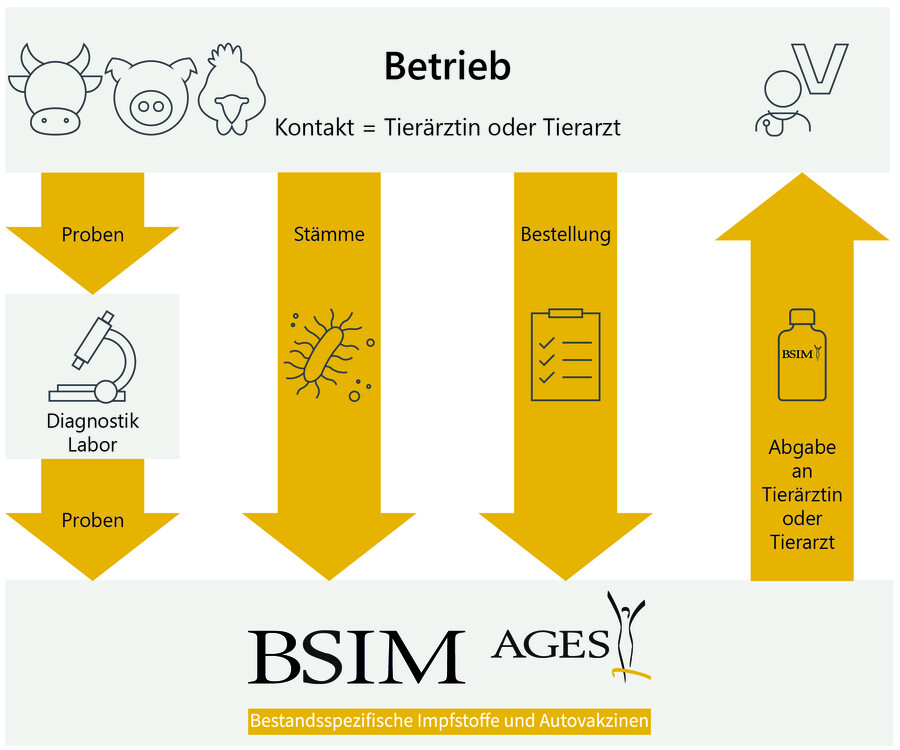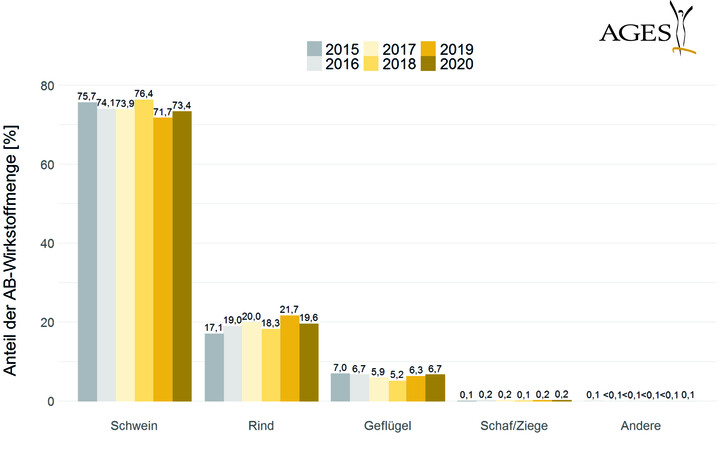Herd-specific vaccines reduce antibiotic use and decrease resistance
Climate change, new and known infectious diseases or diseases transmissible from animals to humans, and antibiotic resistance are three major challenges of the 21st century. In Austria, about 70 tons of antibiotics are used annually in human medicine and about 44 tons in veterinary medicine. "We want to further reduce the use of antibiotics in the veterinary sector and improve the resistance situation in Austria," emphasizes AGES Managing Director Dr. Anton Reinl against the background of the production of stock-specific vaccines and auto-vaccines at the AGES site in Mödling. On the part of AGES, one wants to provide appropriate scientific solutions and technical answers in accordance with the "One Health" approach. "After all, resistance to antimicrobial agents poses a threat to the population and domestic livestock," emphasized AGES head of veterinary medicine Univ.-Prof. Dr. Friedrich Schmoll. "Vaccine prophylaxis with herd-specific vaccines and auto-vaccines provides a contribution to maintaining animal health and is part of the solution for reducing antibiotic use and thus reducing antibiotic resistance."
Customized vaccines for healthy animals
A herd-specific vaccine is an inactivated vaccine, not a live vaccine, made using a pathogen (viruses, bacteria such as Mycoplasma spp., fungi) isolated from a specific herd or animal and used only in that herd or on that animal. "These customized vaccines encompass the current germ spectrum of the particular farm and are used by the veterinarian for targeted vaccine prophylaxis in cattle, swine, poultry, goats, sheep, fish and other species," Schmoll further explains. The veterinary experts at AGES have a wealth of specialist knowledge in herd-specific infection diagnostics and expert advice on keeping domestic and wild animals healthy. The Animal Health Business Unit also houses national reference laboratories for numerous animal diseases and acts as a monitoring and research institution in connection with the reduction of antibiotic use or resistance. "This practical know-how is the basis for planning targeted vaccination prophylaxis in accordance with the motto 'prevention is better than cure,'" Schmoll emphasized.
Resistance as a danger for humans and animals
Identical or structurally related antibiotics are used in human and veterinary medicine. "Any use of antibiotics can lead to a selection of resistant bacteria," said PD Dr. Burkhard Springer, head of the AGES Reference Laboratory for Antibiotic Resistance. "A further increase in antibiotic resistance will have significant health and economic consequences." Against the backdrop of a discussed EU-wide ban on certain reserve antibiotics in animal husbandry or the reservation of these antibiotics for human applications, Springer gave an overview of the current situation in Austria: in the poultry sector, he said, it has been possible to reduce antibiotic consumption volumes by half to 2.4 tons since 2011, "a success story." In the pig sector, however, the situation has looked largely unchanged for years. About three-quarters of antibiotic consumption in the veterinary sector falls on pig production on a multi-year average, Springer said, with implications for animal foods: "In Austria, we find antibiotic-resistant intestinal bacteria (note: ESBL- and/or AmpC-forming E. coli bacteria) in almost two-thirds of pig intestines and in about 10 percent of fresh meat in EU monitoring programs."
Vaccines for all livestock and pets
Targeted use of stock-specific vaccines and auto-vaccines can reduce or eliminate drug and antibiotic use. Resistance and residue problems as well as waiting times do not exist. Vaccinations thus promote health and save costs when used continuously. "Vaccination is an established measure to prevent the spread of disease," said veterinarian Dr. Gottfried Schoder, federal coordinator of Austria's animal health services (TGD) and head of TGD Upper Austria. Since vaccine development does not always keep pace with changes in pathogens, "the use of herd-specific vaccines can be a valuable addition," the veterinarian said. This involves isolating the causal pathogen, multiplying it, inactivating it and packaging it in the vaccine in a quality-assured manner. AGES scientists see great potential for improving the health of livestock, including organic farms, as well as in the pet and small animal sectors. "For us, direct contact with veterinarians and improved knowledge among farmers is important in order to jointly deepen the targeted use of herd-specific vaccines," said Dr. Astrid Weiss, head of AGES' Herd-Specific Vaccines Department. Essential for the success of the treatment is the cooperation of veterinarian, farm, diagnostics and production. Farmers should contact their supervising veterinarian if they have any questions about possible applications, sampling and use. The vaccine is ordered and vaccinated by the veterinarian.
"Along with climate change, antimicrobial resistance is one of the major threats of the 21st century for the population and livestock," emphasized AGES Managing Director Reinl. Therefore, he said, the reduction of antibiotic resistance is a strategic priority topic for the coming years, following AGES' corporate goal "Keep Austria healthy - humans, animals, plants, soil!", which will be strengthened with appropriate resources and research activities. "Domestic vaccine production by AGES ensures the supply of stock-specific vaccines and auto-vaccines of high quality," Reinl concluded.

